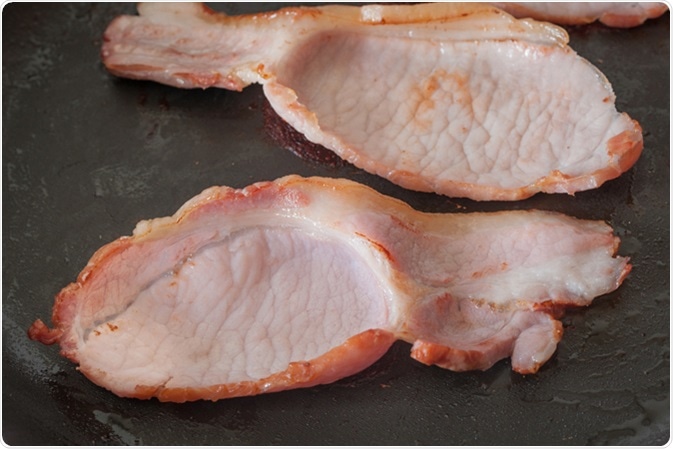Genetically modified leaner pigs are on the cards soon. Researchers in china used the gene-editing technology, CRISPR, to create pigs that are less fatty and leaner with more muscle. This could mean genetically modified bacon on the plates. Their study was published in the latest issue of the Proceedings of the National Academy of Sciences.

Bacon. Image Credit: D. Pimborough / Shutterstock
Lead author Jianguo Zhao of the Institute of Zoology at the Chinese Academy of Sciences in Beijing, and his team used the gene editing technology CRISPR-Cas9 to edit and correct a specific protein the pig genome or pig DNA called the Uncoupling protein 1 (UCP1). This protein works in normal animals by regulating body temperature with the help of burning fats in the body. The team in their experiment created 12 healthy pigs who had edited genomes that meant they were less fat and more muscular.
The pigs actually lack the UCP1 gene that codes for the protein. Most mammals have this protein UCP1 that actually leads to heat production from the brown fat and is called the key component of “nonshivering thermogenesis” or maintenance of body heat without shivering. The UCP1 protein is present over the inner mitochondrial membrane in the cells. Pigs lack this UCP1 protein and it has been found that this could be a reason for their fat accumulation as well as intolerance to cold weather.
The scientists inserted this gene coding for the protein in these experimental pig cells taken from mouse cells. These cells then were used to create over 2,553 cloned pig embryos that were implanted in 13 female pigs. Of these mother pigs, three became pregnant and they finally gave birth to the 12 healthy male pigs called the UCP1 KI pigs. These pigs could control and regulate their body temperatures better and also had 24 percent low fat.
The study began with the objective of reducing the UCP1 fat in the pigs to make the pigs in the farms less susceptible to the cold. This would cut costs for the farmers. However, as happens often in science, the results showed low fat pigs that completely baffled the scientists. Zhao said modifying the gene would have made the pigs “maintain their body temperature much better” helping them survive the cold weathers better and this is a “big issue in the pig industry”.
At six months these pigs were slaughtered and examined to test for any abnormalities and none were found. One of the male pigs in the experiment also mated and produced healthy offspring, the researchers wrote.
Now that the gene editing has resulted in the genetically modified pigs, he explained, that the taste of the bacon would hardly change. However experts speculate that the Food and Drug Administration would probably not approve of a genetically modified bacon very soon. These kinds of food items are still strictly regulated they experts say. Quite a few researchers have called these developments in gene editing exciting and significant. Authors of the study write about the significance of this study saying, “UCP1 KI pigs are a potentially valuable resource for the pig industry that can improve pig welfare and reduce economic losses”.
What you need to know about CRISPR | Ellen Jorgensen